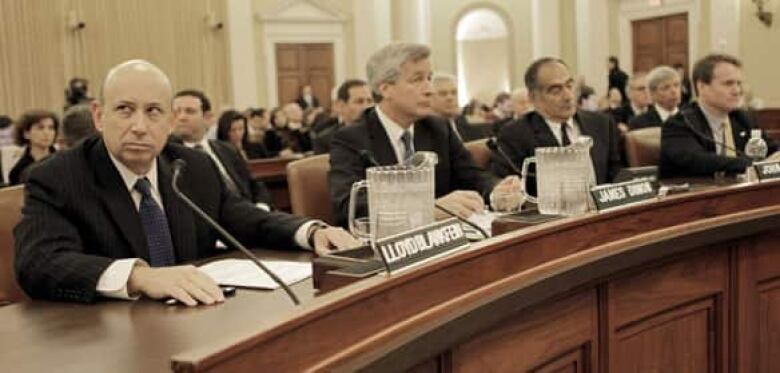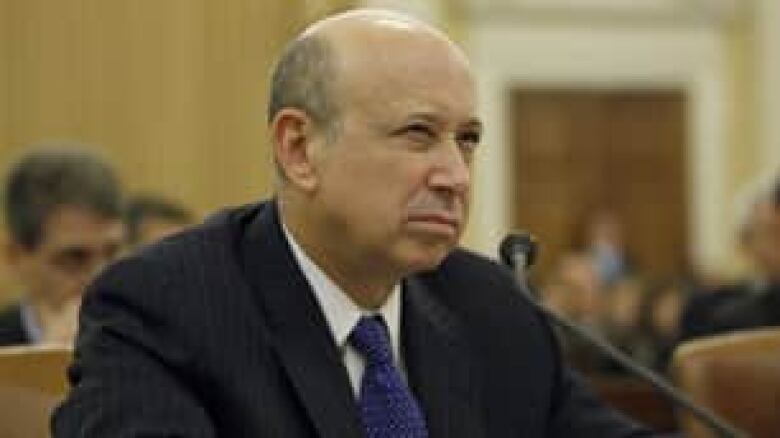'We made mistakes,' U.S. bank CEOs admit

Wall Street executives, raked over the coals for lavish compensation plans,apologized Wednesday forindustry-wide mistakes in front of a committeeinvestigating the financial crisis of 2008-2009.
Americans are furious and "have a right to be" about the hefty bonuses banks paid out after getting billions of dollars in federal help, Financial Crisis Inquiry Commission chairman Phil Angelides toldthe headsof four of America's largest financial institutions at the group's first public meeting in Washington, D.C.
Pledging"a full and fair inquiry into what brought our financial system to its knees," Angelidestook executives from Morgan Stanley, JP Morgan Chase, Bank of America and Goldman Sachs to task for several hours.
The panelhas begunits year-long inquiry amid rising public fury over bailouts and bankers' pay.
"What we've seen this year is unprecedented in the 40 years I've spent in the financial industry," Morgan Stanley chairman John Mack said. "There's no doubt that we as an industry made mistakes."
"We understand the anger felt by many citizens," said Brian Moynihan, chief executive and president of Bank of America. "We are grateful for the taxpayer assistance we have received."
'There's no doubt that we as an industry made mistakes.' Morgan Stanley's John Mack
In December, Bank of America raised private fundsto repaythe $45 billion USworth oftaxpayer aid it received during the depths of the financial crisis.
With the yoke of that loan removed,Moynihan said "the vast majority of our employees played no role in the economic crisis" and do not deserve to be penalized with lower compensation.
"Our remaining employees are an important part of our future," he said."We need to pay them adequately to keep them." Compensation levels will be higher next year than they were in 2008 but not at levels before the financial meltdown, he warned.
Jamie Dimon, CEOof JPMorgan Chase & Co., said most of his employees took "significant cuts in compensation" in 2008. He said his company would continue to pay people in a "responsible and disciplined manner" to attract and retain top talent.
Still, Dimon said, "We did make mistakes and there were things we could have done better."
John Mack, chairman of Morgan Stanley, said the crisis was "a powerful wakeup call for this firm." He said he didn't take a bonus in 2009 andhis bank has overhauled its compensation practices to discourage "excessive risk-taking."

Angelides, the Democratic former treasurer of California, questioned Goldman Sachs's Lloyd Blankfein about packaging soured assets into bond-like securities and selling them to investors even as Goldman Sachs was "shorting" the same securities, or making bets they would fail.
"It sounds like selling a car with faulty brakes and then buying an insurance policy on that car," Angelides said.
But Blankfein defended the firm's actions, while vowing to be more diligent in future. "We have to make sure that the products do what the products say. That they're honest," the Goldman CEO said.
"Whatever we did, it didn't work out well," he said. "We were going to bed every night with more risk than any responsible manager would want to have."
Commissioner Heather Murren grilled Blankfein on Goldman's dealings with embattled ensuring AIG Inc.
'Whatever we did, it didn't work out well.' Goldman Sachs CEO Lloyd Blankfein
"AIG was bent on taking a lot of credit risk," Blankfein said. "It was a failure of risk management of collosal proportion."
Much of the questioning surrounded the banks' actions in the volatile U.S. subprime mortgage market during the past decade. Banks made billions by making homeowners out of buyers who couldn't meet traditional lending standards, and then offloading the risk of those loans by securitizing them into more and more obtuse financial instruments.
"U.S. economic growth in thefirst partof this century was funded by home price appreciation," Moynihan conceded. "And an economic expansion built on excessive debt or leverage is unsustainable."
Acrucial blunder was "how we just missed that housing prices don't go up forever," Dimon said. "We did eat our cooking and we choked on it," Mack added.
Year-long inquiry
The bipartisan, 10-member commission hasthe job of writing the official narrative of what went wrong before the financial system nearly collapsed in the fall of 2008.
The commission is modelled on the panel that examined the causes of the attacks of Sept. 11, 2001. But the prototype could be the Pecora Commission, the Senate committee that investigated Wall Street abuses in 1933-34. It was named after Ferdinand Pecora, the committee's chief lawyer.
Congress has instructed the current commission to explore 22 issues, from the effect of monetary policy on terms of credit to bank compensation structures.
With files from The Associated Press












_(720p).jpg)


 OFFICIAL HD MUSIC VIDEO.jpg)
.jpg)



























































































